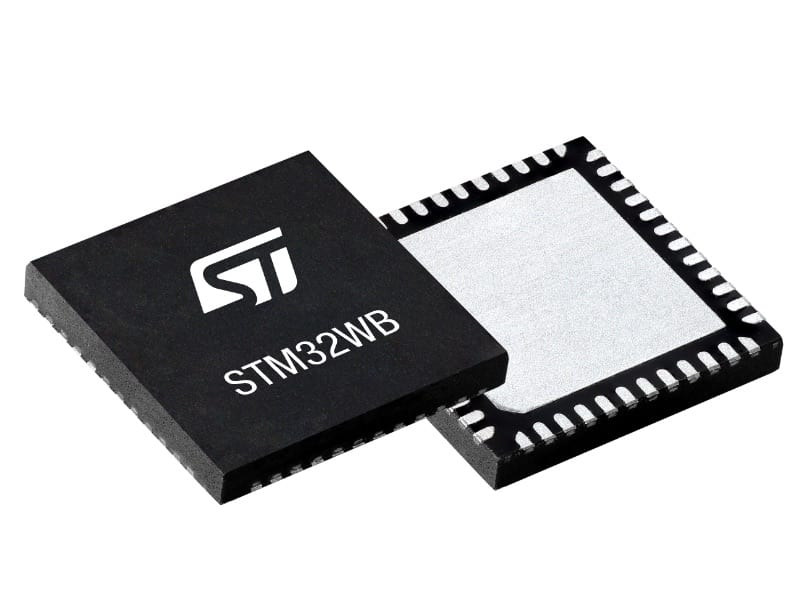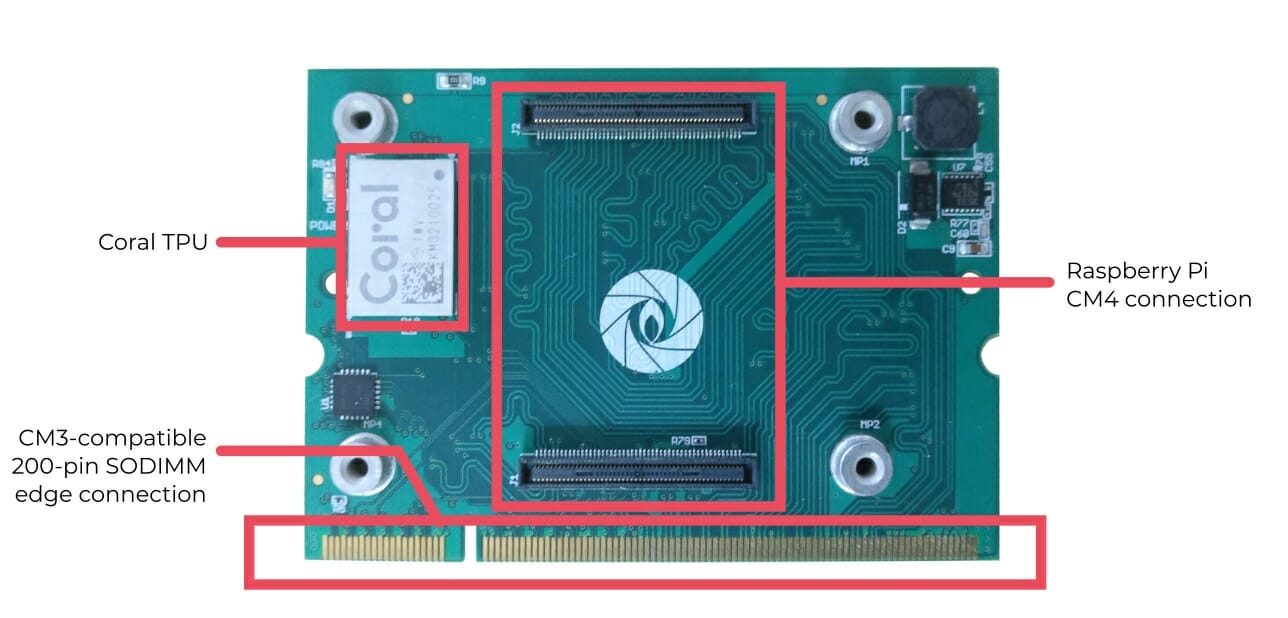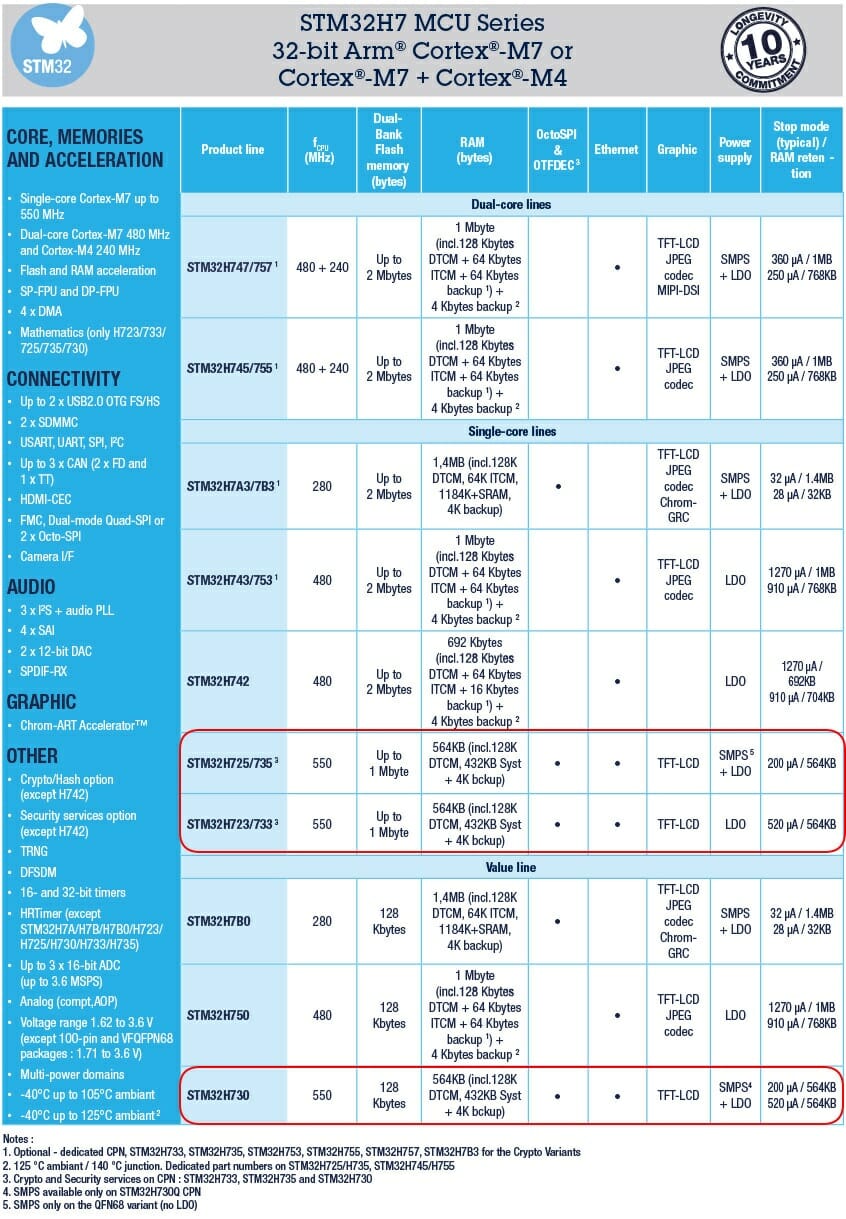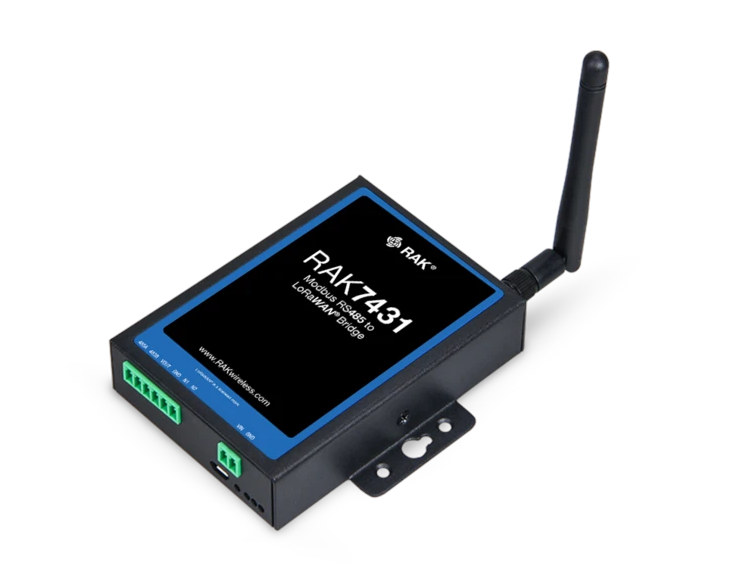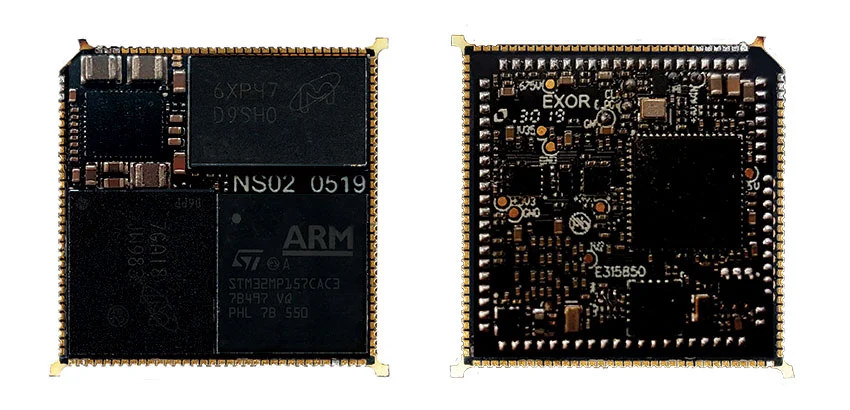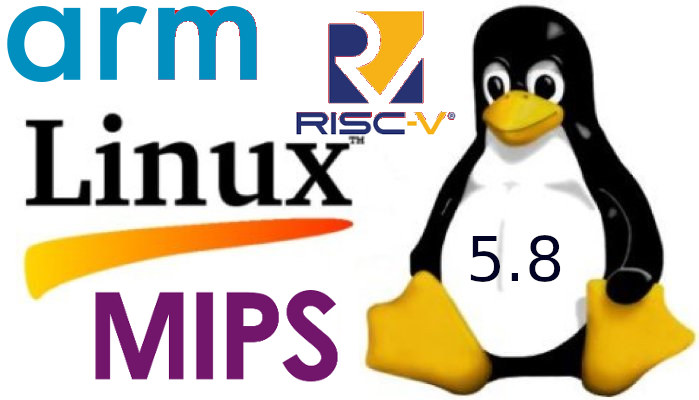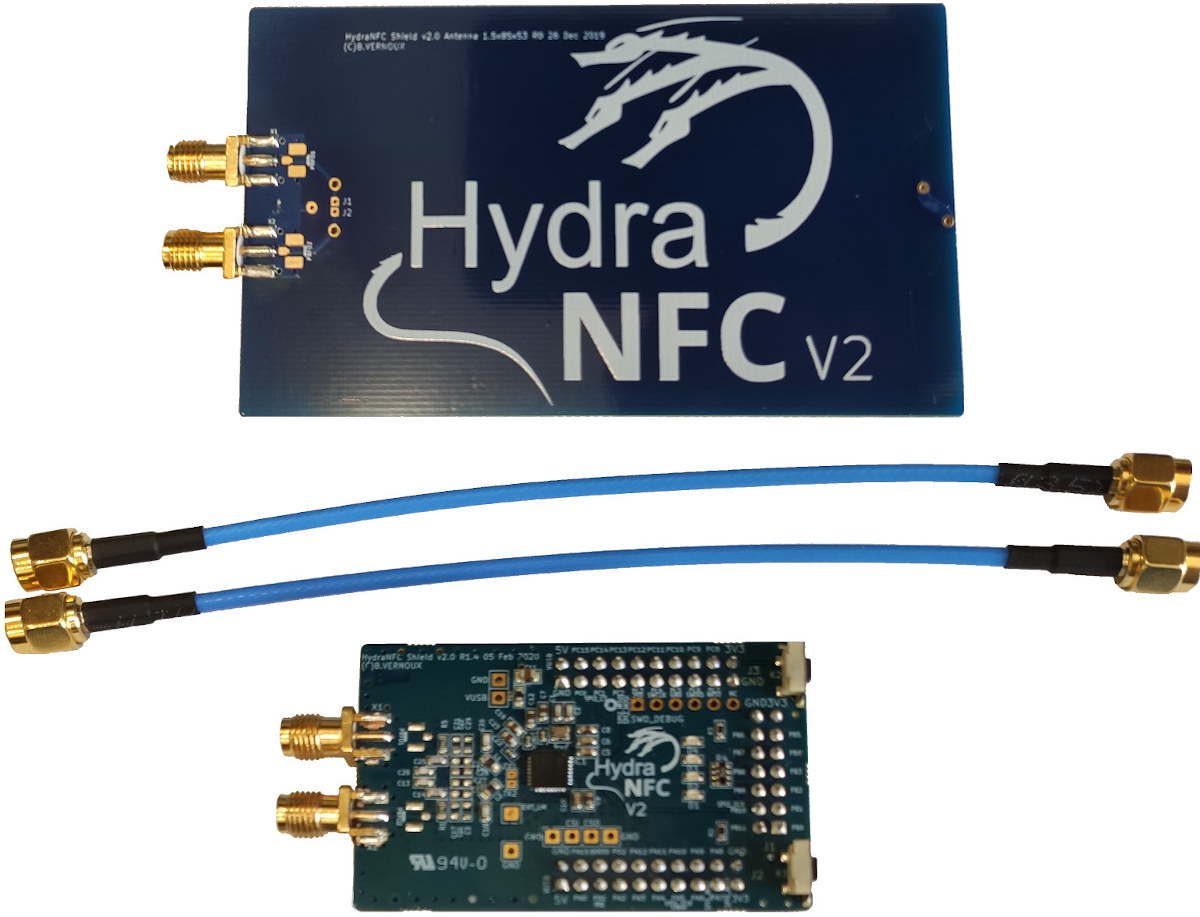STMicro introduced the first wireless STM32 microcontrollers in 2018 with STM32WB Cortex-M4/M0+ MCU family equipped with Bluetooth 5.0 and 802.15.4 radios, and they followed earlier this year with STM32WL Cortex-M LoRa SoC. The company has not just announced yet another wireless STM32 family but instead added the more affordable STM32WB35 and STM32WB30 chips that can be obtained for under $2 in quantities. The new STM32WB microcontroller enabled a low BOM cost thanks to their memory configuration. Specifically, STM32W30 comes with 256KB flash while STM32W35 features 512 KB flash, and both offer 96 KB of RAM. This compares to STM32WB55 will up to 1MB flash and 256KB of RAM. Apart from the lower memory and flash capacity, the new wireless MCUs have basically the same features as other members of the STM32WB family with 16-bit ADC, quad-SPI interface (STM32WB35 only), as well as Bluetooth Low Energy 5.0, Zigbee 3.0, and OpenThread […]
Gumstix Introduces CM4 to CM3 Adapter, Carrier Boards for Raspberry Pi Compute Module 4
Raspberry Pi Trading has just launched 32 different models of Raspberry Pi CM4 and CM4Lite systems-on-module, as well as the “IO board” carrier board. But the company has also worked with third-parties, and Gumstix, an Altium company, has unveiled four different carrier boards for the Raspberry Pi Compute Module 4, as well as a convenient CM4 to CM3 adapter board that enables the use of Raspberry Pi CM4 on all/most carrier boards for the Compute Module 3/3+. Raspberry Pi CM4 Uprev & UprevAI CM3 adapter board Gumstix Raspberry Pi CM4 Uprev follows the Raspberry Pi Compute Module 3 form factor but includes two Hirose connectors for Computer Module 4. The signals are simply routed from the Hirose connectors to the 200-pin SODIMM edge connector used with CM3. Gumstix Raspberry Pi CM4 Uprev is the same except it adds a Google Coral accelerator module. Gumstix Raspberry Pi CM4 Development Board Specifications: […]
New STM32H7 Cortex-M7 MCUs Clock at 550 MHz, Feature Octal SPI Flash and Ethernet Interfaces
STMicro launched STM32H7 single-core Cortex-M7 microcontroller family a while ago, followed by some dual-core Cortex-M7/M4 models, with most clocked up to 480 MHz. The company has now announced five faster parts clocked at up to 550 MHz with STM32H723, STM32H733, STM32H725, STM32H735, and STM32H730 which STMicro claims is “the fastest core speed in the market among MCUs that integrate Flash storage on-chip to run deeply embedded applications”. The embedded flash storage is important, as you may now NXP i.MX RT1170 Cortex-M7/M4 crossover processor can reach up to 1 GHz but does not include flash storage. Key differences in STM32H7 550 Mhz MCUs We’ve highlighted the five new microcontrollers in the table above, and beside the higher 550 MHz frequency delivering 2778 CoreMark and 1177 DMIPS, we can see those are the only parts that support both OctoSPI flash and Ethernet, and all five parts are designed for HMI applications with […]
STMicroelectronics Introduces Zigbee 3.0 to the STM32WB55 microcontrollers
STMicroelectronics has added Zigbee 3.0 support to its STM32WB55 wireless microcontroller family using the Zigbee PRO protocol stack. The STM32 Wireless MCU (STM32WB55) was launched last year with a dual-core Arm Cortex-M4 CPU and Cortex M0+ core, as well as Bluetooth 5 and 802.15.4 radios. STMicro is hoping to expand the applications of the STM32WB into areas like home automation as Zigbee 3.0 is making brands choose Zigbee for their smart-home connectivity solution, smart-lighting, smart-building, mesh IoT connectivity, and many more. The STM32WB55 microcontrollers already provide support for Thread and Bluetooth 5.0 and the inclusion of the Zigbee connectivity will take this to the next level. The STM32WB55 Zigbee 3.0 software includes support for the Exegin Zigbee PRO protocol stack which is available for free. To ease development and deployment, STM32WB Zigbee solution supports 46 Zigbee 3.0 clusters and a further 21 clusters support legacy products and with the Zigbee 3.0 […]
RAK7431 RS485 Bridge Relays ModBUS Data over the LoRaWAN Network
Last year with covered Dragino RS485-LN RS485 to LoRaWAN converter that extends the range of RS485 wirelessly up to 15+km thanks to LoRaWAN connectivity. Rakwireless has now launched a similar product with RAK7431 Modbus RS485 to LoRaWAN bridge. RAK7431 key features and specifications: MCU- STM32L071 industrial-grade MCU with low-power consumption (4uA sleep) LoRa Semtech SX1272 LoRa transceiver Frequencies – RU864, IN865, EU868, US915, AU915, KR920, AS923 Tx Power – 20dBm (Max) LoRaWAN 1.0.3 protocol stack, supports Class A, Class B & C Polling mode, transparent mode and packet mode RS485 6-pin RS485 terminal block Support up to 16x RS485 devices, with up to 32 instruction sets Baud rate – Configurable 9600 to 115200bps Can power RS485 devices via a dedicated output USB – 1x Micro USB configuration port Misc – Reset key, 3x LEDs Input Voltages – 8-48V DC input via 2-pin terminal block; 5V via Micro USB Dimensions – […]
Exor nanoSOM nS02 System-on-Module Features the 800MHz version of STM32MP1 Processor
Arrow Electronics and Exor Embedded have announced the nanoSOM nS02 system-on-module based on the 800MHz version of STMicro STM32MP1 microprocessor unveiled last February. The 25.4 x 25.4mm module is designed for IoT edge applications such as smart IoT controllers and gateways, cloud edge interfaces, and building automation. A supporting development kit can also be provided by Arrow Electronics. NanoSOM nS02 specifications: SoC -STMicro STM32MP157 dual-core Cortex-A7 processor @ 800MHz with 3D GPU System Memory – Up to 1GB DDR3L Storage – Up to 32GB eMMC flash, 4KB EEPROM USB & Ethernet Hub – Microchip LAN9512 controller 131x solder pads with Storage – 2x SD Video Output – 24-bit RGB LCD parallel or 2-lane MIPI DSI Camera Input – 8,10,12-bit video input Audio – 1x I2S channel Networking – 2x 10/100M Ethernet (one native, one via USB hub) USB – 2x USB 2.0 host, 1x USB OTG 4x SPI, 1x I2C, […]
Linux 5.8 Release – Main Changes, Arm, MIPS, and RISC-V Architectures
Linus Torvalds has just released Linux 5.8: So I considered making an rc8 all the way to the last minute, but decided it’s not just worth waiting another week when there aren’t any big looming worries around. Because despite the merge window having been very large, there really hasn’t been anything scary going on in the release candidates. Yeah, we had some annoying noise with header file dependencies this week, but that’s not a new annoyance, and it’s also not the kind of subtle bug that keeps me up at night worrying about it. It did reinforce how nice it would be if we had some kind of tooling support to break nasty header file dependencies automatically, but if wishes were horses.. Maybe some day we’ll have some kind of SAT-solver for symbol dependencies that can handle all our different architectures and configurations, but right now it’s just a manual […]
HydraNFC Shield v2 Delivers Up to 1600 mW with STMicro ST25R3916 NFC Chipset
When Benjamin Vernoux is not working on open-source firmware & tools for AirSpy R0/R2/mini SDR, he spends his time on other projects such as HydraBus STM32 board with NFC support which we covered back in 2014. The HydraNFC Shield that came with the board was based on Texas Instruments TRF7970A NFC chipset with limited features and not compliant with any RF/NFC standard. Benjamin has now launched HydraNFC Shield v2 powered by STMicro ST25R3916 NFC chipset and equipped with a differential antenna. The new version of the shield still works with the original HydraBus board and allows much more output power (1,600mW vs 200 mW) and supports a wider range of NFC features & standards. HydraNFC Shield v2 features and specifications: NFC Chipset – STMicro ST25R3916 high-performance NFC universal device supporting NFC initiator, NFC target, NFC reader and NFC card emulation modes Antenna – Differential antenna with power up to 1600mW […]


